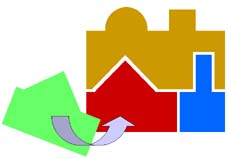
Self-updating Software
9807-15
Start date: 07/98
MIT LCS
Minoru Kubota
NTT
| Research Projects |  |
Self-updating Software9807-15 Start date: 07/98 |
Barbara Liskov and Daniel Jackson MIT LCS Minoru Kubota NTT |
Project summary |
|
The Self-updating Software project is developing an infrastructure that installs, configures and updates software with minimal user intervention, at granularities from individual objects to entire applications.
Project description |

|
In the self-updating software project, we are developing an infrastructure for software that can install, upgrade, and reconfigure itself dynamically, with minimal user intervention. Such an infrastructure might be used for a network of distributed embedded devices that have no user interface and must be updated remotely; for automatic installation and upgrading on personal machines; for maintaining an object database (e.g., in a computer-aided design system) across software upgrades; for bringing applications to handheld devices in a just-in-time fashion, and so on. Our work has focused on two aspects of the problem. The first addresses the problem of updating individual objects in the face of changes to the code of their classes. The second addresses the problem of installing and reconfiguring a collection of software packages in response to requests from a user and notifications of new versions. |
Demos, movies and other examples |
We have developed a scheme that allows upgrades at a very fine granularity. Suppose that some subset of the classes of a large object-oriented program are to be replaced by new versions. Some of the persistent objects will no longer be usable, since their representations may have changed. Our system therefore automatically locates objects that need upgrading, and applies a translation to convert their representations. In order to achieve scalability to large object stores, the translation is performed in a lazy manner, so that the cost is not paid until the new version of the object is needed.
A fundamental problem in such a scheme is compatibility of upgrades. Objects are linked together in an elaborate graph; a change to one object may require the upgrading of other objects that reference it. We have solved this problem by introducing a notion of 'complete upgrades'. Before the upgrade begins, we check that the result of applying it uniformly will be a consistent object store; if the check fails, no upgrades occur at all. We believe that it should be possible to perform this check entirely automatically by employing a static analysis of the code. We are now embarking on a prototype implementation of this scheme.We have built a prototype upgrading infrastructure for software packages.The key idea is that configurations are constructed (and upgraded) automatically from the dependence relationships amongst packages. Each package carries a manifest that indicates which specifications it specifies and which specifications it requires for its subpackages. When a need for a package arises, the specification (currently just a name) is handed to a server, which supplies an address (currently a URL) at which the package may be located. The package is downloaded, and its manifest is analyzed: first to determine that it meets the specification as required, and second to find the packages on which it depends.
A local database on the machine at which the installation is being performed tracks which packages have been installed, and which packages are relying on them. When a need arises, the system actually searches the local database before attempting to download the component. The resulting infrastructure has several key advantages over existing systems, including: fully automatic installation; avoiding multiple downloads and installations of the same component; and the ability to "garbage collect" and remove packages that are no longer needed.
We have demonstrated our prototype both on Java programs, in which the separate packages of the source code are treated as distinct packages, and on a Windows application consisting of binary executables. We are now extending our infrastructure to handle the configuration of packages that have several clients (whether human users or other packages) that customize them in different ways.
The principal investigators |
Presentations and posters |
Publications |
Proposals and progress reports |
Proposals:
NTT Bi-Annual Progress Report, July to December 1998:
NTT Bi-Annual Progress Report, January to June 1999:
NTT Bi-Annual Progress Report, July to December 1999:
NTT Bi-Annual Progress Report, January to June 2000:
For more information |